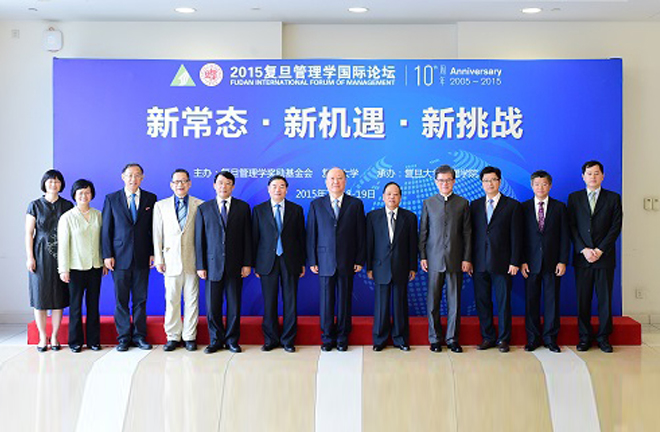Forum: Innovations in management fuel economy

The 2015 Fudan Management International Forum was held from July 18 to 19 in Shanghai.
Management innovations can spur development, scholars from China and other countries said at an international forum on management.
The 2015 Fudan International Forum of Management themed "New Normal, New Opportunity and New Challenge" took place from July 18 to 19 in Shanghai.
New economic situation
The complicated domestic, international economic situation and restructuring have prompted contemplation on ways China can create new products while fostering new technologies and models to drive economic and social development. Attendees to the meeting said theoretical and practical innovations in management science offer a way forward.
After more than 30 years of development, China’s traditional industries are plagued by overcapacity, counterfeiting and homogenization of products. Thus, the traditional mode of supply needs to be adjusted to satisfy the personalized, diversified demands of consumers, scholars said.
In addition, all participants in the meeting reminded management researchers and entrepreneurs to seize good opportunities on one hand and to be aware of the importance and urgency of avoiding risks on the other hand.
Micro-data, full sample
In the era of big data, the economic system is characterized by complex variables, multiple decision-makers, nonlinearity and tight coupling, posing great challenge to economic and social management, said Wang Shouyang, a research fellow from the Academy of Mathematics and Systems Science at the Chinese Academy of Sciences.
“In such a context, research on the economic system is undergoing changes,” Wang said, adding that research paradigms of management science have also changed with the situation, and micro-data and analyses of full samples have attracted unprecedented attention from the academic community.
“The main challenge is from mass data,” Wang said. “Tens of thousands of variables and complicated relations among them add difficulty to the interpretation by researchers who previously based their research models on as few variables as possible.”
In this scenario, the concept of neuromanagement has emerged and gained currency. Ma Qingguo, a professor of management at Zhejiang University, said technical progress has led to an irreversible trend in economic activity, which is to say that manual work is being replaced by mental work. “Therefore, it is urgent to realize that we, in theory or in practice, still focus on the coordination between human behavior and equipment in the process of management,” he said.
Neuromanagement attempts to interpret management behaviors and decision-making mechanisms by studying cranial nerves that control management behaviors, Ma said. “As technology progresses, mental work will play a more important role in the process of management. And the neural perspective may give rise to new theories and methods in the field.”
Macroeconomic regulation
Wei Yiming, director of the School of Management and Economics at the Beijing Institute of Technology, elaborated on how to evaluate the effect and influence of different policies by citing climate change as an example. It has become a policy problem involving environmental, political and economic factors, he said. “Success in tackling climate change not only needs support from technological development but is directly related to the influence of relevant policies.”
Wei said low-carbon economy does not mean denying freedom of choice to people, but rather it entails taking consuming behaviors of households into consideration when enacting policies of energy conservation and emission reduction. One example is providing guidance for living and working styles. He said, by far, prescriptive and regulatory policies have had little effect, and it is imperative to formulate macro policies, such as industrial restructuring and market regulation, to combat climate change.
Economic development should pursue quality growth while maintaining a certain growth rate. Some scholars at the meeting pointed out that the “One Belt, One Road” initiative, or the Silk Road Economic Belt and the 21st Century Maritime Silk Road, and the implementation of the “Internet Plus” plan are part of China’s efforts to develop the economy and improve living standards. Such innovations can inject vitality into society and stimulate the internal vigor of economic development, they said.
Li Yu is a reporter at the Chinese Social Sciences Today.

 PRINT
PRINT CLOSE
CLOSE